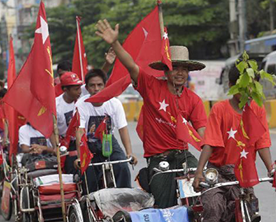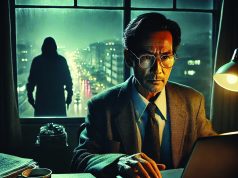The results of the April by-elections point to a new reality – it looks like the honeymoon is over for the NLD (National League for Democracy). The votes confirmed what has been assumed, that support for the NLD has slipped and voters are becoming dissatisfied with elements of their rule. Party leaders may still be in the denial stage and may be waiting for more proof, and it may be too late for them to address the problems people are obviously experiencing.
The year that was
After a year, the state of the nation cannot be agreed upon, and depending on who’s talking, the country is either continuing on its growth path, or it is imploding under the weight of fighting between the different factions and interest groups. The middle ground is probably closer to the truth but it never makes for a punchy soundbite. There were many expectations when the NLD took control of the government. For a people living under the military regime for a long time, change finally came and they wanted it fast. Catching up with the rest of the region is a priority, and the country has to assume its rightful place in the community of free nations. Alas, the anticipated sprint has turned out to be a sluggish crawl – the disappointment could partly stem from voters’ expectations of development being too high. A lot of groundwork needs to be accomplished before things can really take off, such as securing a functional and reliable electricity network. The government’s inability to meaningfully engage with the international community in regards to last year’s violence in Rakhine state has also tarnished Myanmar’s image. Politically, the transition happened. It was, before the Saffron Revolution, almost unthinkable to imagine that the generals of the USDP (Union Solidarity and Development Party) would relinquish hold of government, but it happened. NLD leaders now hold positions of power from the Union down to State levels. But boxed in by the constitution and laws passed during the regime of the military junta and with only the civilian sector in its control, there is a leash that restricts the government in what it can do and when. Economically, the initial flow of capital brought substantial change in the country. The physical transformation of key cities is tangible evidence of change – high rise buildings, improved roads and new airports feel gentrified in the once decaying cities. Leapfrogging in communications and information connectivity opened up instant connectivity and ushered in the virtual world to ordinary people. Suddenly, everybody has got a mobile phone and access to the world outside. The downside is that living conditions in most areas remain the same while the value of the Kyat continues to slide.
The State Counsellor pleaded for understanding as the gargantuan task of putting the country on the path to development required more time. Decades of mismanagement cannot be changed in a snap. She still has the respect of the people, but certain quarters are not happy.
Actors in effecting change
In any change initiative, three actors are evident – change agents, the resistors and the fence-sitters. Overwhelming support for change agents gives them the permission to do what it takes to implement change. This is necessary for implementing change faster than what people are used to, but is also dangerous when the change agents abuse their mandate and become paternalistic or arrogant.
The resistors, on the other hand, can became too engrossed in their interest, disregard the greatest good for the greater number and start to destabilize those who are in power.
The undecided, the fence-sitters, are those who wait and observe who is winning between the change agents and the resistors and throw their lot tilting the balance. Moving with the change agents will means pursuing new directions while siding on the opposite would mean back to the status quo or the conservative agenda of the resistors.
With this perspective as the framework, the current situation can be said to remain in favour of the NLD, who still count on a strong support base in areas that are predominantly Bamar. Secondly, it would be accurate to say that as long as Aung San Suu Kyi is alive and leading the party the USDP can’t hold a candle to her popular appeal or ability to inspire. Events and certain developments, however, point to decreasing support for the NLD. The increasingly open challenge made by ethnic-based parties adds to the chipping-off of the previously monolithic NLD machinery; religious groups have been promoting intolerance; there is an unresponsive and lethargic bureaucracy and continuing military campaigns in ethnic areas, despite the peace efforts. The ‘sweeping operations’ carried out in Rakhine State against Muslim communities has attracted international scorn and cost Aung San Suu Kyi considerable face. These are but some events that contribute to the picture of a government that is seemingly out of control, or totally impotent. This can be manipulated to win over fence-sitters and tip the balance away from the NLD.
An unsolicited advice
Several broad strokes of unsolicited advice could be considered by the NLD leadership to develop a new approach in the way it manages the affairs of the party.
First is to strengthen its political base by empowering its leaders. There is a perception that the NLD is overly centralized, with top party leaders deciding on major issues with limited consultation with its members. Empowering the leaders and its members requires transparency and encouraging healthy discourse – something Aung San Suu Kyi struggles to do.
Younger leaders and those representing ethnic groups should be given opportunities to express their position on various issues facing the nation. Leaders who are unable to express the aspirations of the people they are representing will be alienated. Elected representatives should be able to express what the people want and it should be brought to as many platforms as possible, not just inside the session hall of the parliament. If the voters feel the representatives they elected are not expressing their views, frustration will push them to other leaders who will represent them. The party can have one voice, but it should also encourage healthy debate and mutual respect.
Secondly, the party should be more inclusive. At the time when the fight for freedom was at its height, people were inspired, even willing to die for, and channel their energies into the NLD. There was a time when all were welcome. But the test came when the selection for elective position was made. Instead of accommodating known leaders who worked with the party, it stuck to its policy of determining its nominees based on party loyalty. It has also alienated ethnic leaders and groups who were earlier part of the struggle. Party discipline is good, but parties should be inclusive. Leaders who feel excluded will look for other outlets of their energies and some may be tempted to go to the ‘dark side.’
To facilitate inclusion, a broad coalition can be formed to gather all those who are aligned with what the party represent. In a coalition, they can retain their respective parties without becoming a part of the NLD. It can call on the leaders of the ethnic groups to be part of the coalition. And if they have to be won over, it should include the issues and causes they are fighting for. With a collation, a broad agenda will capture the sentiments of the different groups and factions. This will hopefully entice the fence-sitters to join the party’s fold.
Thirdly, isolate the hardline resistors through transparency. Bringing the issues in the open will expose those with vested interest and those whose interests are not aligned with what the people want. With the full backing of a coalition, any narrow issue can be addressed. All platforms can be used to push this initiative – print, broadcast and even social media.
A new tack
Inclusiveness, transparency, and a loosening of the grip of the State Councillor and her ministers over the functions of the state. This could bring back the charm of the NLD, the spirit that draw people into its fold. This is now the time to see the emergence of the younger generation of leaders, from various groups and orientations, with a common vision of seeing the country rise above petty factionalism.










